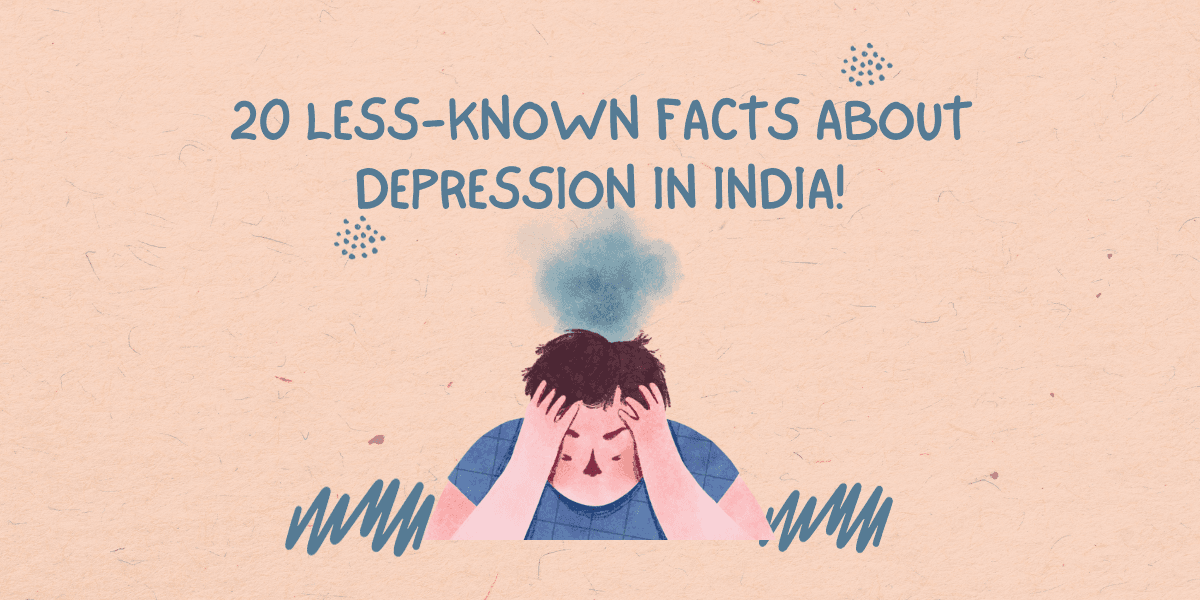20 Less-Known Facts About Depression In India!

‘Depression’ is a common word in India. We use it to describe ourselves when we experience a failure, a heartbreak, or feel tired or upset. But what does this term mean? Although we use it casually, the word itself refers to a diagnosis of a psychiatric disorder. The WHO describes depression as “a persistent sadness and a lack of interest or pleasure in previously rewarding or enjoyable activities.”

“Mental Health Is Not A Destination But A Process.”
We know it can be a bit confusing-so how do we know if someone is depressed or not? Not to worry, we can help you understand more about the disorder. Here we have compiled a list of facts about depression in India. The information has been collected from a range of sources and can be surprising so hold onto your seats!
- The National Mental Health Survey, 2015-16, reported that about1 in 20 Indians suffers from depression.
- The rate of depression in Jharkhand, Tamilnadu, West Bengal, and Manipur was higher than the national rates in 2017.
- In 2017, about 45.7 million people in India were affected by depressive disorders.
- Depression contributed the highest to the total disability-adjusted life-years (DALYs) (33.8%) in 2017.
- In India, the prevalence of depressive disorders is higher than communicable diseases, such as HIV/AIDS and tuberculosis.
- The prevalence of depression in urban metros is higher when compared to rural and non-metro regions in India.
- More females than males are affected by depressive disorders in India.
- Depression in India is reported to be highest in the age group 40-49 years.
- In India, depression is higher in the productive age group (30-59 years). This has a significant effect on the country’s economy.
- A study in 2018 highlighted a higher risk of depression among Indians in the lowest-income category.
- Individuals who have been recently separated/divorced/widowed also have a higher risk of depression.
- Another study found that about 42.5% of Indian corporate employees suffer from depression or an anxiety disorder.
- Nearly 50% of individuals with depressive disorders in India also experience another mental illness.
- It almost takes 2.5 months for Indians to seek help for depression after the symptoms start to appear.
- Almost 50% of those with major depressive disorders have difficulty carrying out daily activities.
- Depression is often associated with non-communicable diseases such as diabetes.
- About one-third of individuals seeking healthcare facilities in India could have symptoms related to depression.
- The cost of care for individuals experiencing depressive disorders is approximately one-sixth of their monthly household income.
- The National Mental Health Survey 2015-16 also identified that nearly 23 million adults would need care for depressive disorders.
- In India, the prevalence rate of depression is also associated with the suicide death rate.
Do You Think You Have Depression?
So how did you like reading these research findings? We hope it has given you a better understanding of “depression’.
If you think that you might have depression, please reach out to the CareMe Health team!
We have a brilliant team of licensed professionals. They are highly qualified clinical psychologists and psychiatrists who can help you deal with depression! Book your first session now!
Did You Find This Blog Informative?
We hope reading this blog has helped you understand better about depression in India.
Do you have some more interesting facts to share?
Did you find something specific that you loved about our blog?
We look forward to hearing about your experience reading this blog!
Related Articles

Letting Go With Grace: Emotional Tools for Closure
Letting go is never easy. Whether we are parting ways with a loved one, ending a relationship, leaving a job, or saying goodbye to a cherished chapter of life, the emotional weight can feel overwhelming. Yet, closure is essential for our emotional well-being. Without it, we carry unresolved grief, anger, regret, or longing that can seep into new relationships and experiences, holding us back from healing and growth.

Boundaries in Love: Saying ‘No’ Without Guilt
Love, in its truest form, should be a safe space—a space where individuality is not only respected but celebrated. Yet, in many relationships, especially in the Indian cultural context, love is often misunderstood as constant availability, complete sacrifice, and putting the other person first, always. As noble as this may sound, this version of love often leads to emotional exhaustion, suppressed resentment, and the erosion of one’s identity.

Gaslighting in Relationships: What It Is and How to Heal
Gaslighting is a form of emotional abuse that erodes your ability to trust your own perception. It’s a slow, insidious process that often begins with subtle doubts and ends with complete self-questioning. In romantic relationships—especially in the Indian context where silence, compromise, and duty are often mistaken for love—gaslighting can be even harder to recognize.

Employee Motivation 2.0: Modern Hacks vs. Traditional Methods
Sitting in his corner office, Amit, the CEO of a fast-growing tech firm, rubbed his temples in frustration. “We’re losing good people,” he muttered, scanning the latest resignation letter on his desk. “Our turnover is skyrocketing, productivity is slipping, and I can feel the low energy in the office. What’s going wrong?”

Toxic Relationships and Mental Health: Recognizing the Red Flags
Relationships should bring joy, support, and a sense of belonging. However, not all relationships are healthy. Some become emotionally draining, mentally exhausting, and even harmful. When a relationship turns toxic, it can severely impact a person's mental health, leading to anxiety, depression, and a loss of self-worth.

Parental Pressure and Mental Health: The Unspoken Struggle of Indian Youth
Parental expectations are a universal experience, but in India, they often come with immense pressure. From scoring high marks 📚 to securing a high-paying job 💼, the burden on Indian youth is immense. While parents want the best for their children, excessive expectations can take a toll on mental health, leading to anxiety, depression, and even suicidal thoughts.
